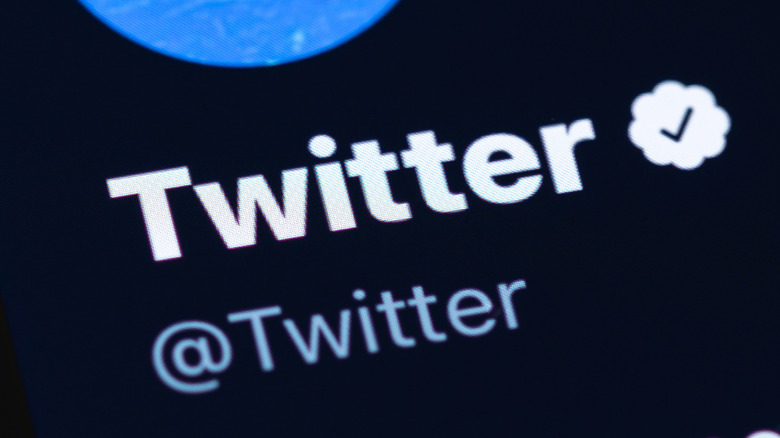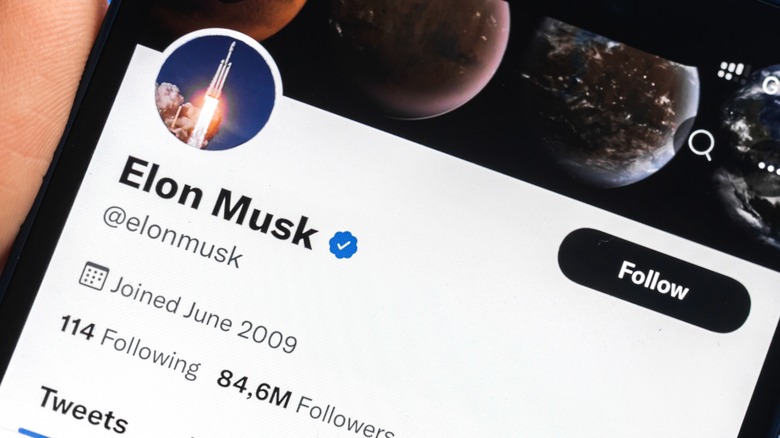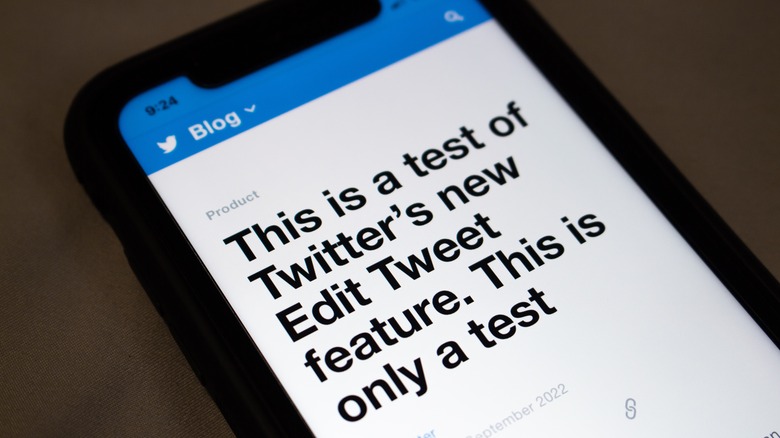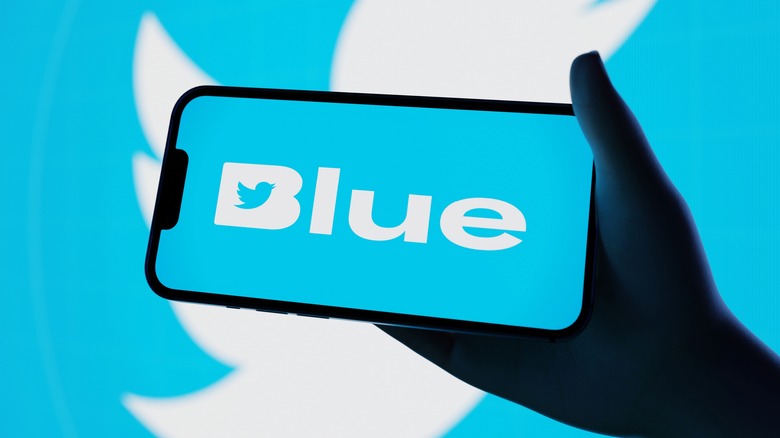Twitter Could Charge For Verified Accounts As Elon Musk Hunts Profits
Elon Musk has some big changes planned for Twitter. After acquiring the company, the world's richest man fired three prominent board members, he has spent months talking about how he wants to turn Twitter into a "free speech platform," and his desire to combat bots operating on the site is well known. One less high-profile decision might have a huge impact on Twitter's most prominent accounts — those with blue verified checkmarks.
The whole verification process is being revamped right now
— Elon Musk (@elonmusk) October 30, 2022
Musk spent around a fifth of his total net worth acquiring the company, so it's safe to assume he'll want some form of return on his investment. Before the takeover was finalized, the billionaire released a statement in an attempt to reassure advertisers the platform wasn't going to turn into a "free-fo-all hellscape." Advertising income makes up the majority of Twitter's revenue, and a couple of big names are currently assessing where Twitter is going under Musk before continuing to run ads on the platform — so it's easy to see why Musk attempted to clarify his position. Outgoings are also being reassessed, with the company currently making layoffs in an attempt to balance the books.
But advertising isn't Twitter's only income stream. The platform has a premium subscription service, which could potentially bring in some much-needed extra income. If rumors reported by Platformer prove true, that subscription service could soon be a requirement if verified users want to keep their checkmarks. The outlet claims the story has been verified by two sources, though Twitter hasn't made an official comment. However, Musk did recently tweet that the "whole verification process is being revamped" while responding to a user who had been denied verification several times despite seemingly being qualified.
How does verification currently work?
Twitter verification is currently free, and the service has benefits for verified users, Twitter itself, and everyone else on the platform. The main benefits of verification are as follows: it lets users know that an account is owned by the person it represents, it helps Twitter combat misinformation, and it lets users with a blue tick near their name feel a bit special. Verified users' tweets are also more prominent, and they have little features like the option to only view tweets addressed to them from other verified users.
The checkmarks themselves are currently handed out for a variety of reasons, with most going to celebrities, politicians, journalists, and other public figures. Twitter says verified users need to be "authentic, notable, and active," but it's a broad church. Factors like follower count have nothing to do with verification. There are many local journalists and politicians with follower counts under 1,000 who have check marks. This is because someone could make an account pretending to be them and use that fake account to spread misinformation.
Getting verified involves submitting a form to Twitter with proof of who you are, along with the reason you believe you should be verified. In most cases, these forms have to be submitted while a verification window is open, and the requests usually take months to process. There are obviously exceptions. If a world leader, notable organization, or A-list celebrity opens an account, their verification will more than likely be fast-tracked.
What might change?
If the leak is true, the biggest change will be users having to hand over close to $60 per year to keep their verified status — or, depending on which leak you listen to, an astronomical $20 per month (via The Verge). It's hard to gauge how much Twitter would make from the move. Tens of thousands of users are currently verified, but it's safe to assume many will have a Twitter Blue subscription anyway. As for the ones that don't, a good amount would presumably cave just to keep their little blue status symbol. However, some organizations may refuse to pay up — which could lead to a few awkward situations for Musk's latest company.
Say the President of the United States' account refused to pay, Twitter would have to make an exception or deal with a situation where one of the most notable accounts on its platform is not authenticated. Given the fundamental reason for verification is to combat misinformation, this could be a major issue. The service itself is also only available in a handful of countries, so Blue would either have to be made available worldwide, people outside the areas where Blue is a thing would have to be given a bye, or thousands of verified users would lose their checkmarks without being able to do anything about it.
According to the man who broke the news about the changes, Casey Newton, the powers that be at Twitter are considering granting the perks that come with a checkmark to all Twitter Blue users. There's also a chance nothing will happen as, if the rumors are true, things are only in the discussion phase.
What is Twitter Blue?
Twitter Blue launched in a handful of countries last year; it's a premium service that adds perks and extra features to a user's Twitter account in exchange for a monthly fee. Originally, the service was only available in Canada and Australia, but it has since expanded to the United States and New Zealand, too. The features Blue launched with were somewhat limited. There was an "undo" button that allowed users to think about what they were tweeting and back out within 30 seconds. There are bookmark options to help with organization, reader mode to help make long threads more manageable, and some superficial customization options that may make the app more pleasant to look at.
Last month, Twitter actually added a useful feature to the subscription service in the form of an edit button. Twitter users had been asking for a way to edit tweets for years. Before the button was implemented, users who had made a typo or forgot to tag something were either forced to live with it or delete the tweet and try again. The edit does have some reasonable limitations.
Other users can see a tweet has been edited and can also view previous versions of that tweet — so using it to fix a typo is fine, but using it to cheat your way through an argument will lead to you being found out fairly quickly. Twitter hasn't released subscription numbers for its premium service, so it's hard to gauge exactly how popular it is. It's also impossible to know if essentially forcing verified users to get on board will give it a boost or ruin the app entirely. As with all the other questions surrounding Musk's takeover, we'll find out eventually.



